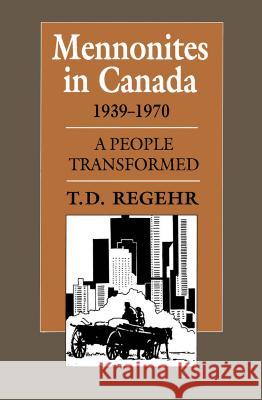Mennonites in Canada, 1939-1970: A People Transformed » książka
Mennonites in Canada, 1939-1970: A People Transformed
ISBN-13: 9781442615038 / Angielski / Miękka / 1996 / 602 str.
When war broke out in 1939 Canadian Mennonites were overwhelmingly a rural people. By 1970 they had largely completed one of the greatest migrations' in their history - the transformation from a rural to an urban community. In this third and final volume of Mennonite history in Canada, T.D. Regehr shows how the Second World War challenged the pacifist views of Mennonites and created a population more aware of events, problems, and opportunities for Christian service and personal advancement in the world beyond their traditional rural communities. Regehr describes how the war also initiated the urbanization process and brought in its wake a new wave of Mennonite immigrants, with different traditions and values, from Europe. Regehr traces as well the less cataclysmic and more far-reaching influences of urbanization on Mennonite identity. He demonstrates how the specialization, rationalism, and individualism that typically accompany the shift from a rural to an urban society produced new vocations, including a large business and professional class; created new values that were often at odds with traditional ones; and profoundly affected community and church life. Regehr balances a detailed institutional analysis with numerous insights into the lives of ordinary people, stressing the role and problems of women in what has been essentially a patriarchal society. Though, as he shows, the Mennonites were a people transformed, ' they were not assimilated. They retained a separate identity and preserved the distinctiveness of their faith and culture.











